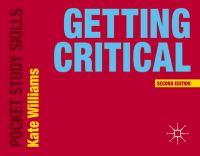What is critical thinking?
A set of skills and an attitude of mind that you will need to cultivate and practise

Reading critically
Thinking critically through targetted reading helps you build your argument as you go

Writing critically
Ways to demonstrate your critical thinking in your writing

Top Tips
none
Spot the signals in the brief
Discuss, analyse, synthesise, contrast, consider, compare, evaluate,
criticise, interpret, justify.
Read and interact with texts
- See note making and research.
- Always consider the purpose, context and the author’s motivation.
- Practise summarising and paraphrasing.
- Be curious and explore – but watch out for distractions (keep reminding yourself to focus).
Multiple sources
- Compare and evaluate views from different sources.
- Creating spidergrams and concept maps shows the bigger picture and how ideas fit together.
In your writing
- Be well informed rather than opinionated.
- Show that your ideas and interpretations have developed from the research that you have done.
- You won’t always find a single clear answer or interpretation – you may need to embrace uncertainty.
- See writing tips.
Multiple sources
- Compare, contrast, evaluate and contextualise views from a range of authors
- Remember that academic debate will rarely arrive at a single answer
Be logical and informed
- Aim to be logical, reasonable, focussed and systematic
- Be informed rather than opinionated
- Use different paragraphs to separate critical writing from writing that is just descriptive
Resources
Resources

MindMup
Free online mind mapping tool that doesn’t require an account to use.
Getting Critical
A useful short guide to critical thinking in practice.
Draw.io
“Draw.io is free online diagram software for making flowcharts, process diagrams, org charts and network diagrams”. Links easily to Google Drive, Dropbox and One Drive to make saving mindmaps easier
5 Active Reading Strategies
5 Active Reading Strategies for Textbook Assignments - College Info Geek